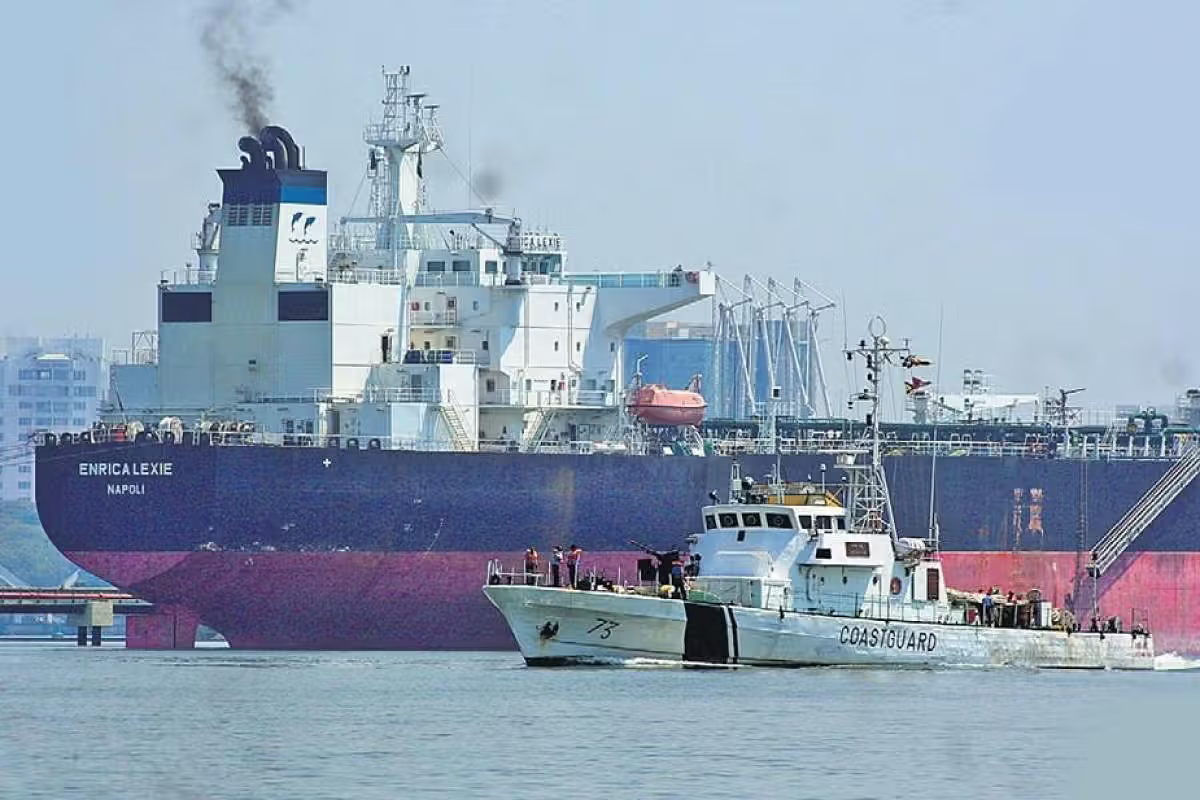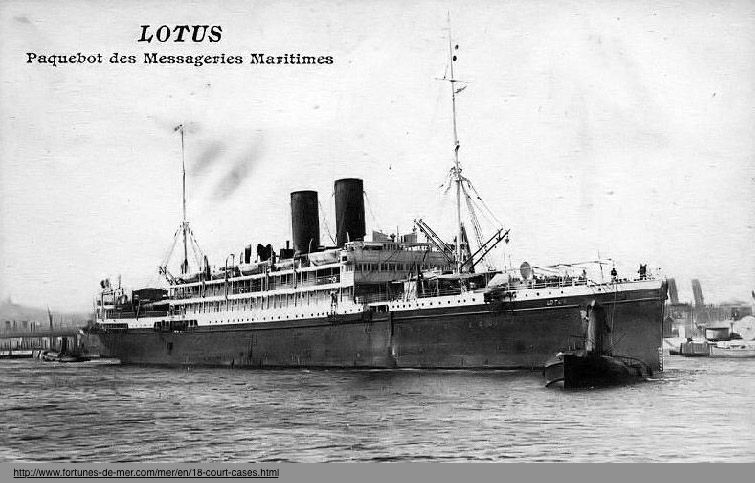Critical Analysis of the Enrica Lexie Case in Light of the SS Lotus Case

The prolong history and the continued existence of Piracy over the years have given rise to various treaties, and conventions such as UNCLOS[1]that equip and entitles nation states to implement anti-piracy measures in order to promote maritime trade.[2]The Anderson case[3], the Caroline[4], the Franconia[5], and the S.S. Lotus[6] case which bore much resemblance to the Enrica Lexie Case are all landmark instances that have had a profound effect on the concept and practice of the Laws of Sea under Public International Law.

The "Enrica Lexie" case has strong resemblance to the S.S. Lotus case[7] which was a ruling by the Permanent Court of International Justice (PCIJ) where a collision occurred between a French steamer and Turkish vessel claiming the lives of eight Turkish nationals following which Turkey’s attempt to prosecute the captain of the French steamer was challenged.[8] The PCIJ ruled in favor of Turkey since the Turkish vessel was equated to Turkish land permitting to exercise jurisdiction for accidents under customary international law since the collision’s effects occurred on Turkish Territory[9]and as a consequence, the principle of objective territoriality was established.[10] Many perceived S.S. Lotus being relevant to the Enrica Lexie case, nevertheless there are significant variations in the circumstances of the case, rendering the ruling in the S.S. Lotus case inapplicable. Nonetheless, the Enrica has raised a set of legitimate issues, including the exercise of state authority outside of territorial waters[11]and the UNCLOS' applicability, and the central question of sovereign immunity raised by Italy[12], prohibiting India from exercising criminal jurisdiction over the shooting because the offenders were members of the Italian military forces stands valid.[13]
BACKGROUND
The Enrica incident dates back to 2012 when two marines on-board of an Italian flagged shipping vessel sailing with an Italian Military Protection Department on board on its way to Djibouti came across St. Antony, an Indian fishing vessel. When two Italian Marines in command of the vessel misinterpreted the Indian Fishing vessel for a pirate vessel, shoot two Indian Fisherman at about 20.5 nautical miles off the coast of Kerala, in India's exclusive economic zone (EEZ).[14]As a result, the Italian ship was ordered to dock in Kochi, and the two Italian Marines were charged with murder under Section 302 of the IPC[15].
Since 2012, the dispute resulted in a number of controversies[16] and judgements[17]hampering the diplomatic ties between India and Italy[18]. Right from 2013 when the SC established that the Union of India has jurisdiction to exercise criminal jurisdiction[19]declaring the Kerala HC’s jurisdiction nullified[20]to ordering NIA to take action against the two marines under Suppression of Unlawful Acts[21] was met with protests by the international community such as NATO[22]and EU[23]. The dispute finally arrived at the Hague in 2016[24]whose arbitral award was released in 2020[25]resulting in two marines granted with immunity and India was barred for exercising jurisdiction over them and India officially accepting the award of Italian Government’s compensation offer and announcing termination of all criminal proceedings against the two marines.[26]
CRITICAL ANALYSIS
Jurisdiction Conundrum: The cardinal legal dispute in the Enrica Lexie case was whether India could exercise its criminal jurisdiction given that the incident took place beyond the territorial waters of India.[30] India based its jurisdictional claims pursuant to Art.92(1) UNCLOS which gives states exclusive jurisdiction over ships flying their flag on the high seas[31]and by virtue of Art.58(2)[32], this principle of exclusive flag-state jurisdiction also applies in the Exclusive economic zone where the Enrica incident occurred and hence, India enjoyed jurisdiction over the shooting that occurred on St. Antony and further argued the attraction of passive personality principle allowing states to claim jurisdiction over offences committed against its nationals[33]. On the other hand, Italy relied on Art.92 and 97 of UNCLOS which states that when on high seas, ships are subject to absolute authority of the flag ship[34]and in case of any instances of collision or other incident of navigation, the judicial authorities of the flag state shall have jurisdiction[35]respectively.
It is however pertinent to note that as per Art.27 of UNCLOS if the crime perpetrated and its repercussions are extended to the coastal state, the state's criminal competence can be stretched to the ship.[36]However, ships sailing through territorial waters are covered by this rule, the ship in Enrica was in the Contiguous Zone at 20.5 nm as per UNCLOS[37], and the Convention gives no indication of jurisdiction outside of territorial and internal waters of the sea.[38] According to UNCLOS Art.94(7), every marine incident resulting in the death or serious harm of nationals or ships of another state on the high seas should be investigated by the flag state and other countries should cooperate with such investigation. However, it is unclear if the flag state's responsibility extends to the contiguous zone or EEZs.[39] In the event of a collision or matters of navigation occurring on the high seas, no arrest or detention, even as a measure of investigation, shall be ordered by any authorities other than the flag state.[40] Additionally, if we draw differences of facts between Lotus case and Enrica, we find that the Enrica incident occurred in the contiguous zone where India has limited sovereign rights, whereas the Lotus occurred on the high seas[41] and the legal basis for Lotus judgement was overturned by treaty law i.e., under Art.97 UNCLOS, 1982[42].
Based on such ambiguity, however, the PCA allowed Italy to claim jurisdiction to try this matter[43], nevertheless, if a trial was performed in India and punishment handed out in line with Indian law would have better serve victim satisfaction. Furthermore, a trial held in a foreign nation would deprive the victims of their right to participate in the proceedings, which is an important facet of a fair trial.
Sovereign Immunity- A Bad Precedent?: State authorities are granted immunity under Art.236, UNCLOS for acts undertaken in their official capacity. Italy maintained that the marines had sovereign immunity considering they were members of the Italian navy and part of a Vessel Protection Detachment (VPD) that was stationed in accordance with government directions and international responsibilities to defend the ship against piracy and MoU between the Italian Ministry of Defense and the Italian Shipowners Association was used to put the VPD mechanism into action[44]and by exercising criminal jurisdiction over two marines, India breached Articles.2(3), 56(2), and 100, UNCLOS.[45]
Furthermore, drawing distinction between Lotus and Enrica, the commander of the French ship SS Lotus was not a French government official[46]however, the two marines on Enrica were members of the Italian armed forces who were specially deployed in accordance with Italian law allowing sovereign immunity.[47] State officials' immunity must be regulated by international or bilateral treaties. It should not be used haphazardly to resolve jurisdictional disputes. Furthermore, even though the Italian marines are considered state officers, they were stationed on an Italian commercial vessel[48]. The tribunal's ruling on the marines' immunity establishes a hazardous precedent as countries will now pass legislations to grant immunity to their military and security people, by proclaiming them state officials, and then transporting them on various types of commercial boats for ulterior purposes resulting in an increase in tensions, particularly between adversarial states, and especially if there are conflicts involving fisherman between neighboring governments.
CONCLUSION AND SUGGESTION
The eight years long quest for justice against the two fishermen from Kerala, the “Enrica Lexie” Case have opened a prolong number of concerns in the debate of Laws of Seas and more particularly in the issues of exercising criminal jurisdiction over contagious and Exclusive Economic Zones and conferring sovereign immunity upon officials against the use of armed forces on shipping vessels.
As a matter of suggestion, the author finds that as per as Art.59 of UNCLOS is concerned, it states that in cases where this Convention does not attribute rights or jurisdiction to the coastal State or other States within the EEZ , and a conflict arises between the interests of the coastal State and the interests of any other State, the conflict should be resolved on the basis of equity[49]. Article 59 may well necessitate courts in the future to assess established theories of extraterritoriality on the grounds of equitable principles and to protect the best interest of two or more States, instead of adapting predefined rules like the Lotus Principle, or the acceptance of Italy’s immunity claim abolishing the exercise of concurrent jurisdiction by both India and Italy.
Nonetheless, the impact from this debate has demonstrated that, in addition to effective diplomatic policy, multilateral initiatives to evaluate and interpret controversial sections in international legal instruments are also required. This is especially critical in places where there are few regulations, such as the placement of governmental officials on commercial maritime vessels. The Indian administration should keep a close eye on the proceedings against the two marines before an Italian court and the government should direct the Embassy in Rome to ensure that a diplomat is present at all court proceedings.
[1] Gemma Andreone, The Future of the Law of the Sea Bridging Gaps Between National, Individual and Common Interests, 5, (Springer International Publishing 2017).
[2] 4, Yvonne Baatz, Maritime Law, 2, (Taylor & Francis 2017).
[3] Rex v. Anderson, (1868) 11 Cox Crim Cases 198.
[4] The Caroline v. United States, 11 US 496 (1813).
[5] The Queen v. Keyn, (1876) 2 Ex. D.63.
[6] S.S. Lotus France v. Turkey, (1927) P.C.I.J., Ser. A, No. 10.
[7] Duncan B. Hollis, The Case of Enrica Lexie: Lotus Redux?, OpinoJuris, (June 17, 2012), http://opiniojuris.org/2012/06/17/the-case-of-enrica-lexie-lotus-redux/.
[8] Guy Des Rosiers, Enrica Lexie Case: Criminal Jurisdiction at Sea, The, 22 ILSA Quart.
18 (2013).
[9] Gian Maria Farnelli, Back to Lotus? A Recent Decision by the Supreme Court of India
on an Incident of Navigation in the Contiguous Zone, 16 INT'l COMM. L. REV. 106
(2014).
[10] K.D. Raju, Criminal Jurisdiction Beyond Territorial Waters: Prosecution of Italian
Naval Marines in India, 8 NUALS L.J. 261 (2014).
[11] Preetha S., Conflict of Laws and the Jurisdictional Dilemma in the Italian Mariners'
Shooting Case, 7 INDIAN J.L. & Just. 38 (2016).
[12] Roger O’Keefe, “International Crime” exception to the Immunity of State Officials from Foreign Criminal Jurisdiction, 109 AJTIL Unbound 168 (2016).
[13] Id. at 170.
[14] Byron Sequeira, Enrica Lexie Case: A Study, The Daily Guardian, (July 16, 2020), https://thedailyguardian.com/enrica-lexie-case-a-study/.
[15] Amol Verma, India’s Tryst with the Enrica Lexie: A Breakthrough or a Setback?, Jindal Forum for International and Economic Laws, (Sep 7, 2020), https://jindalforinteconlaws.in/2020/09/07/indias-tryst-with-the-enrica-lexie-a-breakthrough-or-a-setback/.
[16] Enrica Lexie: Trouble that sailed in 9 years ago from across seas in Kerala killing its fishers, The New Indian Express, (June 16, 2021 05:53 AM), https://www.newindianexpress.com/states/kerala/2021/jun/16/enrica-lexie-trouble-that-sailed-in-9-years-ago-from-across-seas-in-kerala-killing-its-fishers-2316810.html.
[17] Id.9.
[18] Jitendra Nath Misra, Enrica Lexie Case: A Diplomatic Wrangle Nears Resolution, The Wire, (Jul 20, 2020), https://thewire.in/diplomacy/enrica-lexie-case-a-diplomatic-wrangle-nears-resolution.
[19] 6, Abhinav Mishra, Case Comment: Enrica Lexie’s Case- India v Italy, 6 Christ Law. J., 111 , (2017), https://doi.org/10.12728/culj.10.7.
[20] Id.
[21] Ravishankar M, The National Investigation Agency and the Enrica Lexie case, Centre For Public Policy Research, (July 23, 2013), https://www.cppr.in/archives/the-national-investigation-agency-and-the-enrica-lexie-case.
[22] Reuters Staff, NATO expresses concern over Italian marines' case in India, The Reuters, (Feb 12, 2014), https://www.reuters.com/article/us-italy-india-marines-nato/nato-expresses-concern-over-italian-marines-case-in-india-idUSBREA1B1DU20140212.
[23] The Enrica Lexie case: Hamburg puts the “status quo”, Newsletter for the European Union, (Aug 27, 2015), http://www.newslettereuropean.eu/enrica-lexie-case-hamburg-puts-status-quo/.
[24] Satyabrata Pal, The International Tribunal's Ruling on the Italian Marines is a Setback for India, and Justice, The Wire, (May 4, 2016), https://thewire.in/diplomacy/the-international-tribunals-ruling-on-the-italian-marines-is-a-setback-for-india-and-justice.
[25] Devirupa Mitra, Enrica Lexie: In Setback for India, Tribunal Says Country's Courts Can't Try Italian Marines, The Wire, (Jul 3, 2020), https://thewire.in/external-affairs/enrica-lexie-arbitral-tribunal-italian-marines.
[26] Enrica Lexie case: SC orders closure of criminal proceedings against two Italian marines; all you need to know, First Post, (June 15, 2021, 13:22 PM), https://www.firstpost.com/india/enrica-lexie-case-sc-orders-closure-of-criminal-proceedings-against-two-italian-marines-all-you-need-to-know-9718651.html.
[27] Marco Odello, The Enrica Lexie Incident, and the Status of Anti-Piracy Security Personnel on Board, 26, J. Confl. Secur. Law. 551,(2021).
[28] Sony Vijayan, The Use of Armed Forces on Merchant Vessels without Strict Rules for
the Use of Force, 45, J. MAR. L. & COM. 15 (2014).
[29] Aarshi Tirkey, Choppy Waters: On the Italian Marines Decision, Observer Research Foundation, (Mar 20, 2022, 12:21 PM), https://www.orfonline.org/expert-speak/choppy-waters-italian-marines-decision/.
[30] Muskan Bansal, The Enrica Lexie incident, jurisdiction and immunity, The Daily Guardian, (Dec 15, 2021), https://thedailyguardian.com/the-enrica-lexie-incident-jurisdiction-and-immunity/.
[31] Aurel Sari, Part 1 – Tanker, Jailer, Soldier, Sailor: Functional Immunity and the Enrica Lexie Award, Just Security, (Sep 4, 2020), https://www.justsecurity.org/72284/part-1-tanker-jailer-soldier-sailor-functional-immunity-and-the-enrica-lexie-award/.
[32] UNCLOS, 1982, art.58, cl.2.
[33] Id. 31.
[34] UNCLOS, 1982, art. 92.
[35] UNCLOS. 1982, art. 97.
[36] K.D. Raju, Criminal Jurisdiction Beyond Territorial Waters: Prosecution of Italian
Naval Marines in India, 8 NUALS L.J. 261 (2014).
[37] Id.
[38] Prabhakar Singh, India before and after the Right of Passage Case, 5 AsianJIL 176 (2015).
[39] Id. 36.
[40] Id.
[41] Jay Manoj Sanklecha, Is it the End of the Road for India in the Enrica Lexie Incident?, The Wire, (Jul 10, 2020), https://thewire.in/world/the-enrica-lexie-incident-end-of-the-road.
[42] Id.
[43] Id.
[44] Aarshi Tirkey, Choppy Waters: On the Italian Marines Decision, OBSERVER RESEARCH FOUNDATION, (Mar 20, 2022, 12:21 PM), https://www.orfonline.org/expert-speak/choppy-waters-italian-marines-decision/.
[45] Id.
[46] Id.41.
[47] Atul Alexander, Is Immunity for Killing Two Indian Fishermen Justified? Curious Case of “Enrica Lexie”, Opino Juris, (Oct 26, 2020), http://opiniojuris.org/2020/10/26/is-immunity-for-killing-two-indian-fishermen-justified-curious-case-of-enrica-lexie/.
[48] Vivek Katju, India must not cast anchor in ‘Enrica Lexie’, The Hindu, (July 6, 2020), https://www.thehindu.com/opinion/lead/india-must-not-cast-anchor-in-enrica-lexie/article31996616.ece.
[49] UNCLOS, 1984, art. 59.

Comments ()